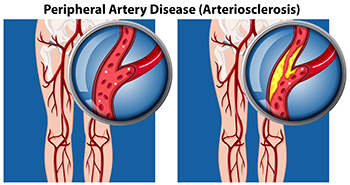
Poor circulation, particularly from peripheral artery disease, or PAD, can significantly affect the health of your feet. PAD occurs when arteries narrow, reducing blood flow to the extremities, most commonly affecting the legs and feet. This diminished blood flow can cause leg pain, numbness, and weakness, which often worsen during physical activity and may persist even at rest. Additional symptoms can include cold feet, pale skin, and changes in toenail health, such as slower growth, thickening, deformation, or discoloration. These issues arise because the reduced blood flow prevents your feet from receiving adequate oxygen and nutrients. In severe cases, PAD can lead to critical limb ischemia, where chronic lack of blood flow results in ulcers, gangrene, and tissue damage. Managing PAD typically involves lifestyle modifications, such as quitting smoking, exercising regularly, and controlling diabetes. If you experience any signs of poor circulation in your feet, it is suggested that you schedule an appointment with a podiatrist for a diagnosis and effective treatment plan to prevent serious complications.
It is important to find shoes that fit you properly in order to avoid a variety of different foot problems. For more information about treatment, contact one of our podiatrists from Foot Doctors of Utica. Our doctors will treat your foot and ankle needs.
Proper Shoe Fitting
Shoes have many different functions. They cushion our body weight, protect our feet, and allow us to safely play sports. You should always make sure that the shoes you wear fit you properly in order to avoid injuries and deformities such as: bunions, corns, calluses, hammertoes, plantar fasciitis, stress fractures, and more. It is important to note that although a certain pair of shoes might be a great fit for someone else, that doesn’t mean they will be a great fit for you. This is why you should always try on shoes before buying them to make sure they are worth the investment. Typically, shoes need to be replaced ever six months to one year of regular use.
Tips for Proper Shoe Fitting
- Select a shoe that is shaped like your foot
- Don’t buy shoes that fit too tight, expecting them to stretch to fit
- Make sure there is enough space (3/8” to ½”) for your longest toe at the end of each shoe when you are standing up
- Walk in the shoes to make sure they fit and feel right
- Don’t select shoes by the size marked inside the shoe, but by how the shoe fits your foot
The shoes you buy should always feel as good as they look. Shoes that fit properly will last longer, feel better, and improve your way of life each day.
If you have any questions, please feel free to contact our offices located in Herkimer, and New Hartford, NY . We offer the newest diagnostic and treatment technologies for all your foot care needs.
